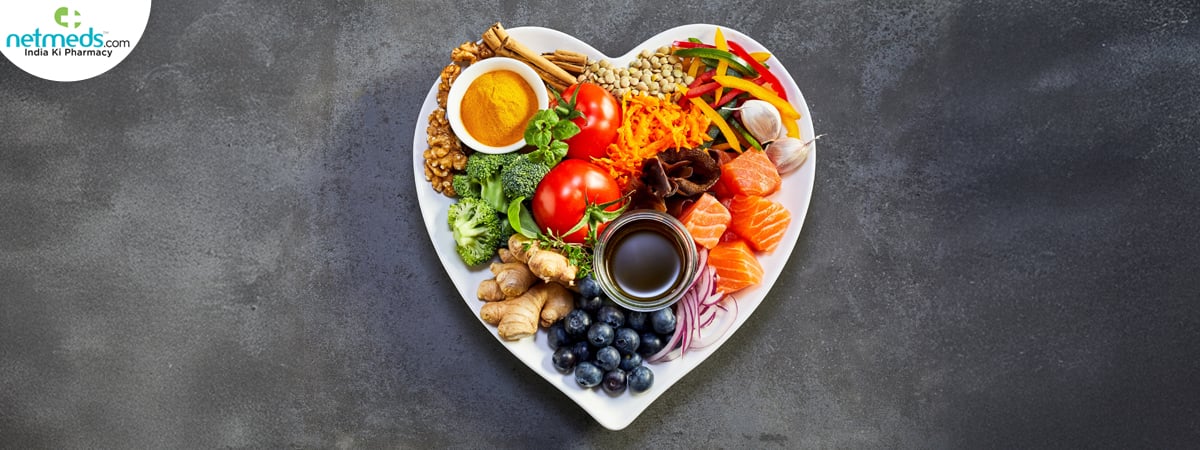Atherosclerosis is a condition that develops when fatty deposits start building up along artery walls. This condition is referred to as clogged arteries or hardening of the arteries, which causes the arteries to narrow and restrict blood flow to the heart and other parts of the body.

Did you know that Indians are more prone to heart disease than our Western counterparts? Yes, as per the Indian Council of Medical Research reports, 32% of Indians living in urban regions are at higher risk of developing heart disease. Mindful eating habits and incorporating a rich array of traditional foods may help you reverse this trend.
For Better Heart Function And Overall Health, Shop From A Wide Range Of Supplements
Foods packed with antioxidants, omega-3 fatty acids and other beneficial plant compounds are known to prevent plaque formation. Nature has conferred us with vast reserves of powerful foods that can gently support cleaner and healthier arteries. These foods help prevent the buildup of cholesterol and plaque, the sticky layers that slow down blood flow and strain the heart.
Take this two-minute read to learn more about their benefits, uses and side effects.
Garlic
Garlic is one of nature’s most powerful foods that is valued for its cardiovascular protective qualities. Loaded with a compound called allicin, garlic helps reduce LDL (bad) cholesterol and prevents it from sticking to artery walls. Furthermore, it supports better blood circulation by relaxing blood vessels, controls blood pressure and prevents clots.
How To Use?
Pound one or two fresh garlic cloves and let them sit for 10 minutes before consuming, as this helps to activate allicin. Consume it raw with water or mix it into boiled vegetables, cooked dishes, soups, or chutneys.
Side effects
Overeating raw garlic may cause heartburn, bloating, or a strong body odour. Those on blood thinners should avoid it and consult their healthcare provider before using it.
Lemon
This citrus fruit is rich in vitamin C, a powerful antioxidant that prevents cholesterol from oxidising, a process that turns it sticky and dangerous. The goodness of natural acids in lemon helps flush out toxins from the blood and liver, indirectly supporting arterial health and boosting good cholesterol (HDL) levels.
How To Use?
Add fresh lemon juice to warm water every morning and drink this infusion on an empty stomach to detox the system. Lemon juice is also used as a salad dressing or added to soups for a tangy flavour.
Side effects:
Too much lemon juice can erode tooth enamel or irritate acid reflux in sensitive people. Always dilute it with water.
Amla
While exotic berries are hyped a lot in the West, we have our own superfruit right in our backyard. Amal, or Indian gooseberry, has been a cornerstone of traditional Indian medicine. The high vitamin C content in ama acts as a powerful antioxidant that decreases LDL cholesterol and increases HDL levels, thereby safeguarding arterial walls from oxidative stress.
Also Read: Amla: Benefits, Uses For Hair and Health Conditions, Supplements And Recipes
How to use?
Take 2 amla and cut into pieces, and make a fresh juice, or add dried amla powder to your detox drinks or morning smoothie.
Side Effects
Excess intake of amla may cause acidity, bloating, diarrhoea and lower blood sugar levels drastically.
Methi (Fenugreek)
Fenugreek seed is a staple herb in Indian kitchens, which is used more than just as a flavouring agent. It contains powerful bioactive compounds that significantly lower cholesterol levels and improve lipid profiles.
How To Use?
Soak fenugreek seeds overnight and have this drink in the morning on an empty stomach. Also, use the leaves liberally in dals and vegetable sabzi.
Side Effects
Excess intake may cause digestive issues like bloating, indigestion, and flatulence, and it may also slow down clotting, so those who are on blood thinners should avoid it.
Curry Leaves
Curry leaves are often overlooked as a mere garnish; these leaves are a storehouse of heart-healthy nutrients. Rich in antioxidants and fibre, they help reduce cholesterol, prevent oxidation and improve blood flow. Studies have revealed that regular intake of curry leaves lowered total cholesterol and triglyceride levels remarkably.
Also Read: Curry Leaves: Medicinal Uses, Therapeutic Benefits For Hair, Diabetes And Supplements
How To Use?
Make a drink of fresh curry leaves, lemon juice and have it on an empty stomach. Liberally add fresh curry leaves to tadkas, or dry and ground them and sprinkle over your food.
Side Effects
When taken in large quantities, it may lower blood pressure drastically, so those who are on hypertensive drugs should use them cautiously. Also, it may cause digestive discomfort like diarrhoea, bloating or gas.
(This article is reviewed by Kalyani Krishna, Chief Content Editor)
Author Profile:
M Sowmya Binu
With over 15 years of expertise and a Postgraduate degree in Nutrition, M Sowmya Binu is a seasoned professional in the field of nutrition. Specialising in tailoring personalised diet plans, she underscores the significance of a balanced approach to health, emphasising the integration of medication with dietary intake for holistic wellness. Passionate about equipping individuals with knowledge to make informed decisions, Sowmya adeptly develops insightful content encompassing a wide array of topics, including food, nutrition, supplements, and overall health.
References:
Anti-Inflammatory Diet for Atherosclerosis and Coronary Artery Disease: Antioxidant Foods
Emi Saita 1,✉, Kazuo Kondo 1, Yukihiko Momiyama 2
https://pmc.ncbi.nlm.nih.gov/articles/PMC4519361/
https://www.medicalnewstoday.com/articles/can-foods-cleanse-the-arteries



 Previous
Previous